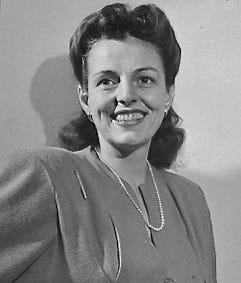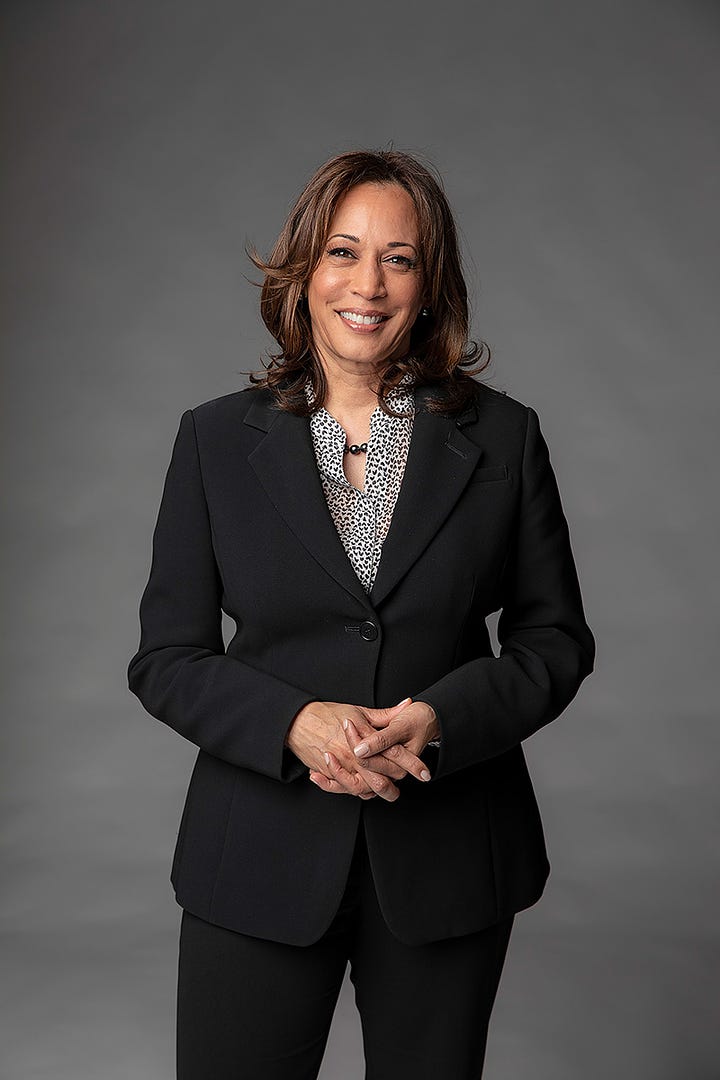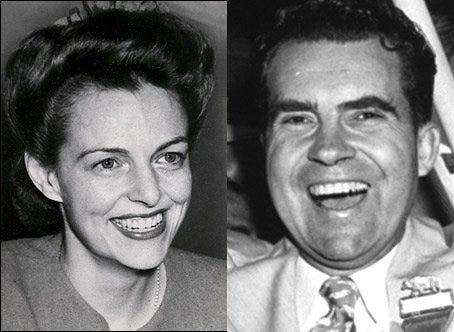Men vs. Women in Politics: From 'Tricky Dick' to Terrible Trump
Helen Gahagan Douglas could not survive Nixon's attacks in 1950--now Kamala Harris may face even worse.
Greg Mitchell is the author of more than a dozen books including “The Tunnels” and “The Campaign of the Century” (see link) and now writer/director of three award-winning films aired via PBS, including “Atomic Cover-up” and “Memorial Day Massacre” (up for an Emmy later this month) . You can still subscribe to this newsletter for free.


The GOP/MAGA attacks on Kamala Harris as a “far-leftist” and “not qualified”—presumably because she is a woman—have already begun in earnest. Donald Trump, happily giving lie to the recent media claim that he was becoming kinder and gentler, has already vowed to “not be nice.” Even Fox News host Neil Cavuto lost patience today with fake good old boy Sen. John Kennedy repeatedly referring to Harris as a “ding dong.” Nothing sexist about that, right?
Which puts me in mind of this: The U.S. Senate seat that Harris won in California in 2016 was deeply contested back in 1950, an immortal contest that I explored in my 1998 book, “Tricky Dick and the Pink Lady.” It pitted the effective, progressive, up and coming Democrat, two-term congresswoman Helen Gahagan Douglas, versus a young Republican with one dirty campaign already behind him, Rep. Richard M. Nixon. Of course, it become infamous for the sexist and dirty tricks uncoiled by Nixon, which led to the classic Watergate era bumper sticker, “Don’t Blame Me, I voted for Helen Gahagan Douglas.”
There’s a lot to unpack but I think I will proceed below by publishing excerpts from the opening chapter of “Tricky Dick” (by the way, a New York Times Notable Book for 1998) this week, which sets up the campaign (and the attacks on Douglas) very well, I think. See Part I, below.
But first, let’s return to old pal Phil Ochs’ “Here’s to the State of Richard Nixon,” then a clip of Helen Douglas briefly reflecting on the 1950 campaign, and finally John Lennon in the studio recording his “Gimme Some Truth” with its swell “Tricky Dicky” mockery.
Part I
In an this atmosphere of vigilance and fear, Californians went to the polls on June 6, 1950, to nominate two candidates for the U.S. Senate, setting the stage for a sensational election contest that fall.
As polls opened on primary day, political "dopesters" went "stir-crazy" trying to predict the results, the Hollywood Reporter observed. With California's population surging it was impossible to predict how the new arrivals would vote. At midafternoon, Helen Gahagan Douglas, the Democratic front-runner in the Senate race, received a telegram from actress Greta Garbo that read, "Helen--Tonight or Never. God bless you." A Broadway hit, “Tonight or Never” had catapulted Helen Gahagan to stardom in 1930 and introduced her to future husband Melvyn Douglas, who later appeared opposite Garbo in Ninotchka.
Garbo must have sensed her friend's need for a boost on primary day, for the campaign had been painful and exhausting. The outgoing Democratic senator, Sheridan Downey, had announced that Douglas did not have "the fundamental ability and qualifications" to replace him and accused her of giving "comfort to Soviet tyranny." Privately, an associate had advised Downey that Douglas was "a self-seeking, highly perfumed, smelly old girl," adding, "I don't believe in sending women to the House of Representatives or to the U.S. Senate either. "A San Jose newspaper reported that if not exactly Red, she was "decidedly pink."
Westbrook Pegler, the syndicated columnist, cataloged her female deficiencies: her inattention to serious duties and her willingness to be nothing more than a "fluttering satellite" of the far left wing of her party. On top of that, fraternity boys at the University of Southern California had sprayed seltzer at her during a campus rally.
Perhaps the most distasteful personal attack, however came from the state's leading political writer. Kyle Palmer of the Los Angeles Times had criticized her Democratic rival, Manchester Boddy, for running a colorless campaign with "too much dignity" but advised that he "might still defeat the lady if he tried--in a political sense, of course--to slap her around a bit." And so as the race tightened, Boddy charged that a "subversive clique of red hots" was attempting to take over the Democratic Party, and he accused Douglas of harboring "communist sympathies."
But it was the newspaper Boddy published, the Los Angeles Daily News, that first put into print a new nickname for Helen Douglas. "The Pink Lady," the Daily News called her.
Through it all, Douglas had remained confident, and with some cause. She was intelligent, articulate, and attractive, one of only nine female members of Congress, the best-dressed woman in public life (according to the Fashion Academy in New York), and the first prominent actor to run for high office. "I know I am going to win," she informed a national Democratic leader.
Most of the party leaders in California, however, opposed her. They didn't like the idea of having a woman in the Senate "with whom they can't make deals," she charged. "In the House it is all right since it is like having a feather stuck in your hat, but it is not all right in the Senate." She had fought back, campaigning furiously, barnstorming by helicopter--the first time this had been done outside Texas. An editorial cartoon portrayed her in a football helmet, stiff-arming male politicians.
Tall and stately, Douglas was the number-one glamour girl of the Democratic Party, a writer for a New York newspaper observed. On the campaign trail, however, she had little time for "feminine necessities" such as getting her hair and nails done, according to the reporter, and she had already put on ten pounds, munching on candy bars to keep up her energy and consuming cakes baked for afternoon teas. Another writer observed that a woman running for the Senate has problems that never bother a "baldheaded candidate." A man goes straight to bed at night after a final speech, but a woman "has to get a shampoo at midnight. She has to go to bed with her head in a towel to dry while she sleeps."
Douglas also had to contend with the demands of two children at home. "But mother!" her eleven-year-old daughter, Mary Helen, had recently implored. "Why must you work so hard? Why can't you stay home and go swimming with me?"
When Douglas visited Santa Clara, a local columnist revealed that she had arrived for a campaign appearance right on time, "sufficiently remarkable in any woman." She looked young for her age, which was forty-nine, and the former opera diva and Hollywood star did it without the usual artifice of makeup, retouched hair, or "trick millinery." From this, the columnist concluded that she was interested "in persuading the minds of her audience, not in charming them off their feet."
Still, the political attacks on the candidate grew harsher, and she was too busy defending herself from attacks by Democrats to go after her likely Republican opponent, Congressman Richard M. Nixon. Yet she told her San Diego organizer, "You know, what happens to me personally isn't very important. But that pipsqueak [Nixon] has his eye on the white House and if he ever gets there, God help us all."
Close to primary day, Douglas assured her mentor, Eleanor Roosevelt, that theRed-baiting was so excessive "it helped us." In San Francisco near the end, she led a march of women carrying grocery baskets up Market Street to protest the high cost of living. A local newspaper published a photo of a radiant Douglas surrounded by the huge crowd under the headline NEVER UNDERESTIMATE THE POWER OF A----. Over the radio, Douglas confidently proclaimed, "Money alone never has won and never will win an election."
Unlike the Democratic front-runner, Richard Nixon, standing first in line to cast his ballot in his home precinct on primary day, was already looking ahead, knowing he was a winner twice over. The savvy young congressman had not only sewn up the Republican nomination for the U.S. Senate, but he had also thrown the Democratic contest into last-minute turmoil with one brilliant stroke.
His campaign committee in Whittier, under the direction of attorney Murray Chotiner, had sent 68,500 leaflets to registered Democrats in envelopes emblazoned with the words AS ONE DEMOCRAT TO ANOTHER! It was true that California's cross-filing laws allowed Nixon to run in the Democratic primary, but he had little hope of winning, and in any case he was not a Democrat. The campaign material failed to disclose his party affiliation, referring to him simply as Congressman Nixon, "The Man Who Broke the Hiss-Chambers Espionage Case."
The same day, a full-page advertisement sponsored by a Democratic committee appeared in several papers under the heading WARNING TO ALL DEMOCRATS. It showed a cartoon Nixon emerging from a barn, holding a pitchfork full of hay (labeled CAMPAIGN TRICKERY) that he intended to feed to a Democratic donkey. "What manner of candidate is this," the copy read, "who will use the United States mail in an attempt to delude Democrats into believing he is one of them?"
The most enduring aspect of the ad was its attempt to provide a pet name or the Republican candidate. Political opponents, poking fun at his Pumpkin Papers detective work in the Alger Hiss case, had once christened him Dick Tracy, but the name did not stick. Now the Democrats tried again. "Look at `Tricky Dick' Nixon's Republican Record," the ad implored.
It had a certain ring.





It's astounding that Trump's 50 years of predatory malevolence - cons, scams, thefts, disloyalty, etc., was forgotten so quickly. It's more astounding that his maga call to arms to the Capitol - the treason, insurrection, and the people hurt or were killed due to this horror so easily dismissed. We experienced his bungle, intentional disregard, moves to cause harm to the masses, remove the ability of female to have contro0l over their own bodies....his shutdown of the gov't in a blackmail attempt to get more $, blocked paychecks to Federal workers and services to the needy for the duration of the shutdown. You mean to tell me that there re no magas who are Federal workers or among the group who depend upon social services to get by? I'd think those magas would convince other magas that Trump, appearing as the devil incarnate lately, would be a bad deal going forward.